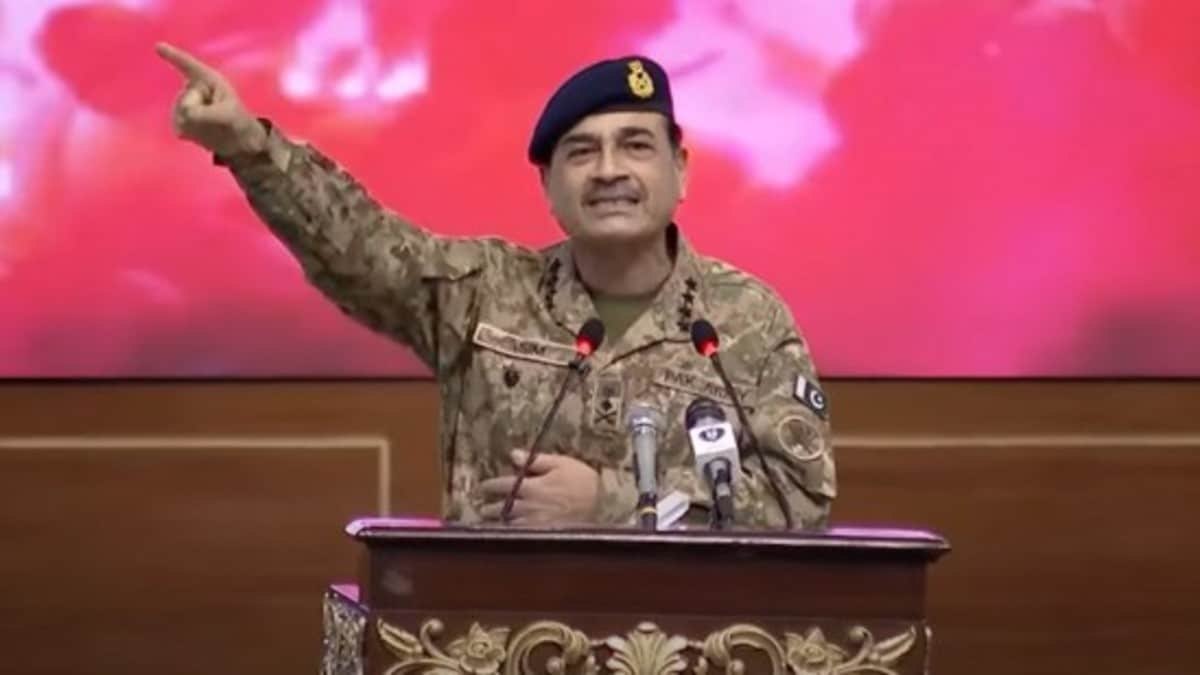Pakistani army chief General Asim Munir’s animated, chest-thumping speech to a group of overseas Pakistanis has left analysts wondering what he was trying to convey—and why he chose to speak at all. Until now, the one arguably positive trait about the general was that, while he was omnipresent in pictures and television frames, he rarely spoke. With his latest statements—threatening action on Kashmir, invoking the ‘Two Nation’ theory, and more—it seems Pakistan is reverting to its old script: terror, instability, and ideological grandstanding.
And that spells trouble. Why did Munir speak at all? In what Geo News called a “historic” address, Munir ticked off a number of topics: a dismissive mention of the “little bit” of terrorism in Balochistan, reminders about Pakistan’s history, Kashmir, and the supposed civilisational divide between Hindus and Muslims. First, it’s surprising that the army chief chose to speak at all.

In most countries, such gatherings of expatriates are addressed by a prime minister or finance minister. These are usually opportunities to present economic data, outline investment opportunities, and build confidence. Instead, this audience got an emotional tirade—against the Baloch, against Hindus, and against just about everyone else.
It was a clear signal: neither expats nor anyone else needs to believe that a democratic system exists in Pakistan. It’s now official—the military is in charge. The prime minister might as well go on permanent leave.
Just a ‘little’ terrorism? One of the most alarming moments was Munir’s offhand reference to “a little terrorism”. Pakistan ranks second-worst globally on the Global Terrorism Index. Its own official reports admit to a nine-year high in terrorist incidents, with a 66 per cent increase in 2024 alone.
On average, nearly seven lives are lost every day due to terrorism. Prominent Pakistani politicians have acknowledged that large parts of Balochistan and Khyber Pakhtunkhwa (KP) are effectively outside government control. Operations in KP date back to 2001, with campaigns like Operation Rah-e-Nijat involving tanks, airstrikes, and full-scale military deployment.
In Balochistan, the air force has been used against domestic insurgents—a reality that has persisted since 1947. And yet, the insurgency has only grown stronger, as seen in incidents like the Jaffar Express hijacking. So, when Munir rattles sabres to loud cheers from the audience, it rings hollow.
Worse, it may endanger even him, especially considering his audience likely included military colleagues. A skewed history lesson At one point, Munir urged the audience to teach their children about the birth of Pakistan. Frankly, it might be better if they didn’t.
Independence was not a uniformly desired outcome. Balochistan resisted it; tribal regions, including those with the Khudai Khidmatgar movement, were actively pushing for a different future. Even in Punjab—despite its 57 per cent Muslim majority—support for Jinnah was far from unanimous.
The Muslim League secured just 73 of 175 seats, barely edging out Congress. In Sindh, the League won only 27 of 60 seats. Its only major victory was in Bengal, which ultimately left Pakistan in 1971 after a brutal military crackdown.
In essence, Pakistan’s creation was contested at every level. What’s even more troubling is Munir’s revival of the Hindu-Muslim divide—rhetoric clearly aimed at India’s Muslims, and that suggests sinister intent. Gaza gets a weak hand Munir’s vibrant support for Gaza also rang hollow.
While Pakistan does send occasional aid, it’s not even among the top 20 donor countries. Moreover, much of that aid is reportedly channelled through Al Khidmat Foundation, the charitable wing of Jamaat-e-Islami (JeI), which has long supported terrorist organisations. In 2006, JeI openly handed a cheque to Hamas—then already a designated terrorist group—and maintains contact with its leaders.
Hamas figures were recently seen at a “Kashmir Solidarity Day” rally in Pakistan, and JeI’s Sirajul Haq has met Hamas leadership in Iran. Reports allege the group raises funds in the US and Europe, often using orphanages as a front. This isn’t the support Munir spoke of—but he certainly knows it exists.
JeI’s calls for jihad in Kashmir are public knowledge. Munir’s emotional cry about Kashmir being Pakistan’s “jugular vein” reveals a bitter truth: with Article 370 gone, it appears Pakistan sees itself as metaphorically “throttled”. Yet ironically, Pakistan, in 1949, separated Gilgit-Baltistan from so-called “Azad Kashmir” (Pakistan-Occupied Kashmir) through an agreement that remains secret and legally dubious.
Unfounded claims of ‘rise’ Munir also made vague references to Pakistan’s supposed “rise”, though it’s unclear by what metrics. Consider his audience: the largest overseas Pakistani populations are in the UK, US, and Saudi Arabia. In the UK, Pakistanis are among the poorest communities, living in some of the most income-deprived neighbourhoods.
Indians, by contrast, are among the most affluent. That’s why Indian diaspora events tend to focus on investment and soft power—not ideological lectures. Still, overseas Pakistanis contribute significantly to the homeland, accounting for nearly 10 per cent of GDP with remittances touching $33 billion.
India, in comparison, receives $129 billion, but that constitutes just 3 per cent of its GDP. Pakistani-Americans are better off, but in the UK, they form what is now widely seen as one of the most radicalised segments. Munir’s speech wasn’t targeted at affluent, educated professionals who tend to avoid public identification with Pakistan.
Instead, it was aimed at nationalist elements among the diaspora. Rather than showcasing reform, he offered threats. Despite the applause, Munir had nothing to sell except intimidation—and that, ultimately, was the real message.
The writer is a Distinguished Fellow at the Institute of Peace and Conflict Studies, New Delhi. She tweets @kartha_tara. Views expressed in the above piece are personal and solely those of the author.
They do not necessarily reflect Firstpost’s views..
Politics

Asim Munir’s rant signals Pakistan reverting to instability, intimidation and ideology

In his recent address to the expatriates, the Pakistani army chief ticked off a number of topics: a dismissive mention of the “little bit” of terrorism in Balochistan, reminders about Pakistan’s history, Kashmir, and the supposed civilisational divide between Hindus and Muslims













